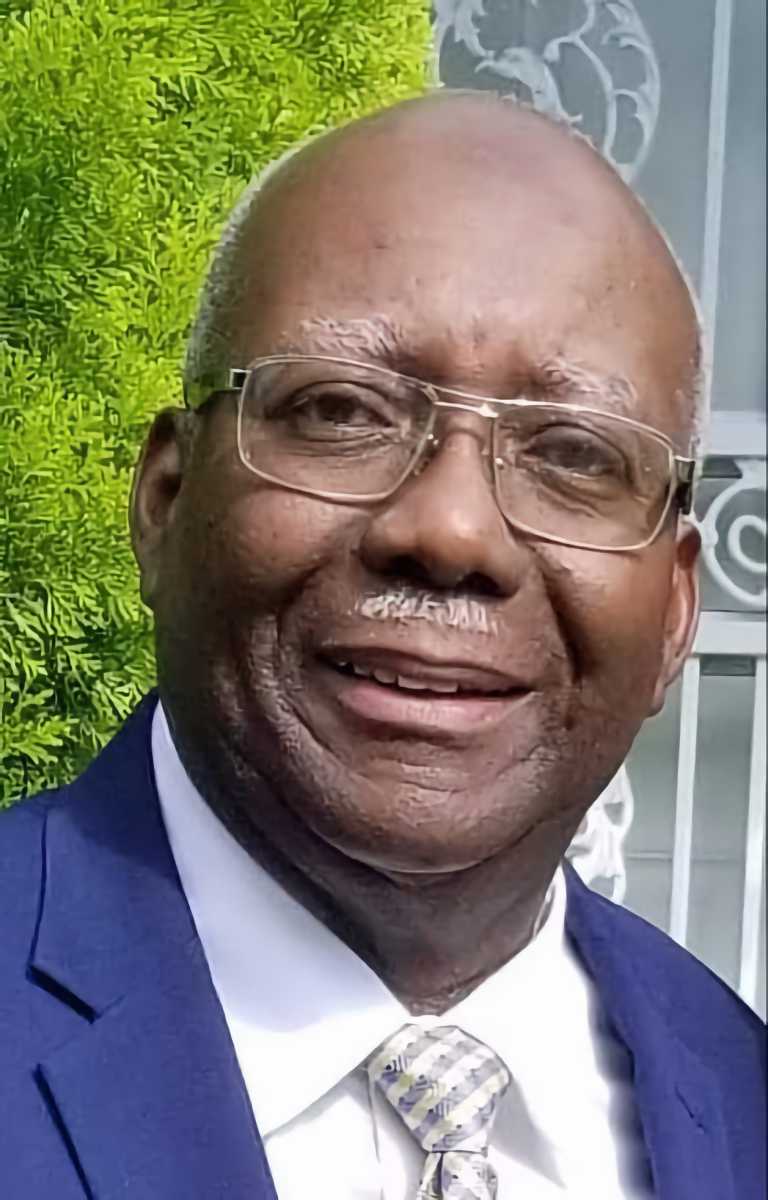Retired Jamaican-born pastor the Rev. Patrick Perrin said he is on the side of reconciliation and peace in the Israeli-Hamas war.
“When tension is high and emotions are raw, reason takes leave, and objectivity disappears. And yet, reason and objectivity are most required during these times in order for there to be meaningful dialogue,” Rev. Perrin – an elder (retired) in the New York Annual Conference (NYAC) of the United Methodist Church (UMC), who last served as the pastor of the St. John’s UMC of Elmont (2008-2019), in Valley Stream, Long Island – told Caribbean Life Tuesday morning.
“Without meaningful dialogue, there will not be reconciliation; and without reconciliation, there will be no healing,” added Rev. Perrin, a St. Albans, Queens resident, who, since retirement, has served Janes UMC in Brooklyn and North UMC in Hartford, CT.
For dialogue leading to reconciliation and healing, he said there is need to define the issues very clearly, stating that “just as married couples, who experience destructive conflicts, need the intervention of skilled counsellors, marriage and family therapists, and even psychotherapists, so do nations at war — whether that war has broken out in open hostilities or whether that war is simmering underground.”
Rev. Perrin – who had pastored churches in Trinidad and Tobago and Jamaica, and, since the 80s, in Brooklyn (Ebenezer Wesleyan Methodist Church, 84-87; St. Marks’ UMC, 87-98; and Hanson Place Central UMC, 98-08 – said “the hostilities, which we have been witnessing between Hamas and Israel since the Oct. 7 attack, when Hamas claimed responsibility for a deadly attack against Israel, is the most recent outbreak of that simmering underground hostility that probably dates back to 1948, when the state of Israel was formed.”
He noted that the Center for Strategic and International Studies (CSIS) has published data, “which should inform discussion of the issues and frame the nature of the dialogue that needs to take place.”
“This dialogue is not only needed to be conducted by the adversarial parties but also by those outside the ring who seek to air their opinions and recommendations,” said Rev. Perrin, a native of Spanish Town, Jamaica; a graduate of the University of the West Indies (UWI) – B.Sc. in economics, B.A. in theology; UTCWI – diploma in ministerial studies; and Christian Theological Seminary (CTS) Indianapolis, Indiana, master’s in ministry.
He stressed that the loss of any human life through widespread conflict calls for humanitarian considerations.
“If we use the word ‘persons’, or if we use the term ‘family members’, we may have a more humanized perspective of the tragedy unfolding daily before our eyes,” said Rev. Perrin, a former Methodist Chaplain at UWI’s St. Augustine campus in Trinidad and Tobago, and erstwhile chaplain tutor at the Excelsior Education Centre (EXED) in Kingston, Jamaica. “Each number represents a mother, father, son, daughter, brother or sister.”
He said another feature of the humanitarian question highlights “the long-term blockade of Gaza since 2007, led by Israel and supported by Egypt.”
“This blockade severely hampers the flow of goods and services essential to the survival of the residents of Gaza,” said Rev. Perrin, who had served on NYAC’s Board of Trustees and Board of Ordained Ministries, and chaired the Conference’s Nominations Committee. “As a result, there is severe economic hardships.”
He noted that unemployment in Gaza is currently at 45 percent, and that the United Nations Conference on Trade and Development (UNCTAD), as early as 2003, had estimated that the blockade and closures had drained as much as US$2.4 billion from the economy of the West Bank and the Gaza Strip.
“Basic food supplies were drastically depleted, bakeries were closed, and food rationing was introduced,” said Rev. Perrin, who, for a brief period, had directed the Youth Employment Program (YEP) of the East New York Development Corporation in Brooklyn, and served as a psychometrician for the Testing Assessment and Placement (TAP) Center of the East New York Development Corporation. “Gaza’s exports were practically zero.”
He said many voices, including Rabbis in Jerusalem and Rabbis in New York, have spoken out against the resulting humanitarian crisis in Gaza.
“As usual, when these kinds of crises occur, there are many overlaying and underlying features, and our knee-jerk reaction is to take sides,” Rev. Perrin said. “The overlaying and underlying features are like the skins of an onion which, as we strip them away, cause uncomfortable and uneasy reactions.
“Some are historical, dating back to British Colonialism and the Balfour Declaration of 1917,” added Rev. Perrin, who had chaired the District Council on Ministries of the Long Island West District, and was a member of the District Committee on Ordained Ministries, The Parish Development Committee, the Superintendency Committee, The Brooklyn Methodist Church Home and The Bethany Methodist Home. “Some are political and are seen through the lenses of the political expediencies of the various parties fighting for control in Israel, Palestine, Europe and the USA.”
Therefore, he said the African proverb is applicable in this context: “When elephants fight, it is the grass that gets trampled.”
But Rev. Perrin reasoned that “there is a way to cut through the onion to the very center, knowing that there will be some unpleasant feelings.
“As a Christian minister, who believes in a ministry of reconciliation, I have to be able to feel the pain of both parties who are hurting and invite both parties to live into each other’s truth,” he said. “So, I have to be on the side of truth. I have to be willing to speak the truth. I have to be on the side of the hurting families on both sides of the divide.
“I have to be on the side of the helpless civilians, who are being slaughtered as we speak,” Rev. Perrin added. “I know on which side I am not. I am not on the side of the weapons manufacturers, who will benefit from the carnage taking place on the battlefields in the various theaters of wars, and the mass shootings in cities across the USA.
“I have to be on the side of justice, and not just any form of justice,” he continued, stating that “there is punitive justice and restorative justice.”
He said punitive justice seeks the punishment of the offender, while restorative justice seeks the forgiveness and restoration of the offender.
Rev. Perrin referred to a young Jewish Rabbi, who once taught his students the following lesson: “’You have heard that it was said, you must love your neighbor and hate your enemy. But I say to you, love your enemies and pray for those who harass you; so that you will be acting as children of your Father who is in heaven. He makes the sun rise on both the evil and the good, and sends rain on both the righteous and the unrighteous. If you love only those who love you, what reward do you have? Don’t even the tax collectors do the same? And if you greet only your brothers and sisters, what more are you doing? Don’t even the Gentiles do the same? Therefore, just as your heavenly Father is complete in showing love to everyone, so also you must be complete’” (Matthew 5: 43-48 CEB).
By the time the young Jewish Rabbi was 33, Rev. Perrin said he was executed by the authorities, “who always seem to view matters through the lens of political expedience.”
But Rev. Perrin said one of the members of the very authorities that sought his execution “came to the truth in a very mystical and mysterious way, and spent the rest of his life as an apologist for that young Jewish Rabbi.”
Rev. Perrin said the following is what the apologist wrote to members of his congregation that met in Phillipi: “’From now on, brothers and sisters, if anything is excellent, and if anything is admirable, focus your thoughts on these things: all that is true, all that is holy, all that is just, all that is pure, all that is lovely, and all that is worthy of praise. Practice these things: whatever you learned, received, heard, or saw in us. The God of peace will be with you’” (Philippians 4: 8 -9 CEB).
“I am on the side of reconciliation and peace,” emphasized Rev. Perrin, a graduate of the Spanish Town Primary School and the St. Jago High School in Jamaica. “On which side are you?”
Pastor Perrin is married to Pansy Perrin, née McKoy, also a graduate of the St. Jago High School and UWI.
In addition to their four children: Ayesha, Ayanna, Ayodeji and Ajahni, and five grandchildren: Emery and Teodor (twins), Mason, Ayla and Ember, Rev. Perrin said he enjoys reading, board games, especially dominoes, watching sports, travel, music (all genres), playing the piano and organ, choral singing and cooking.
He had produced, for a number of years, the radio program, “Sunday Evening Praise,” 9 – 10 p.m., hosted by Pastor Omar Hall, Maureen Gordon and Yvonne Talbot-Andrews, and heard on IrieJam Radio, FM 93.5 in the New York Tri-State Area.



























